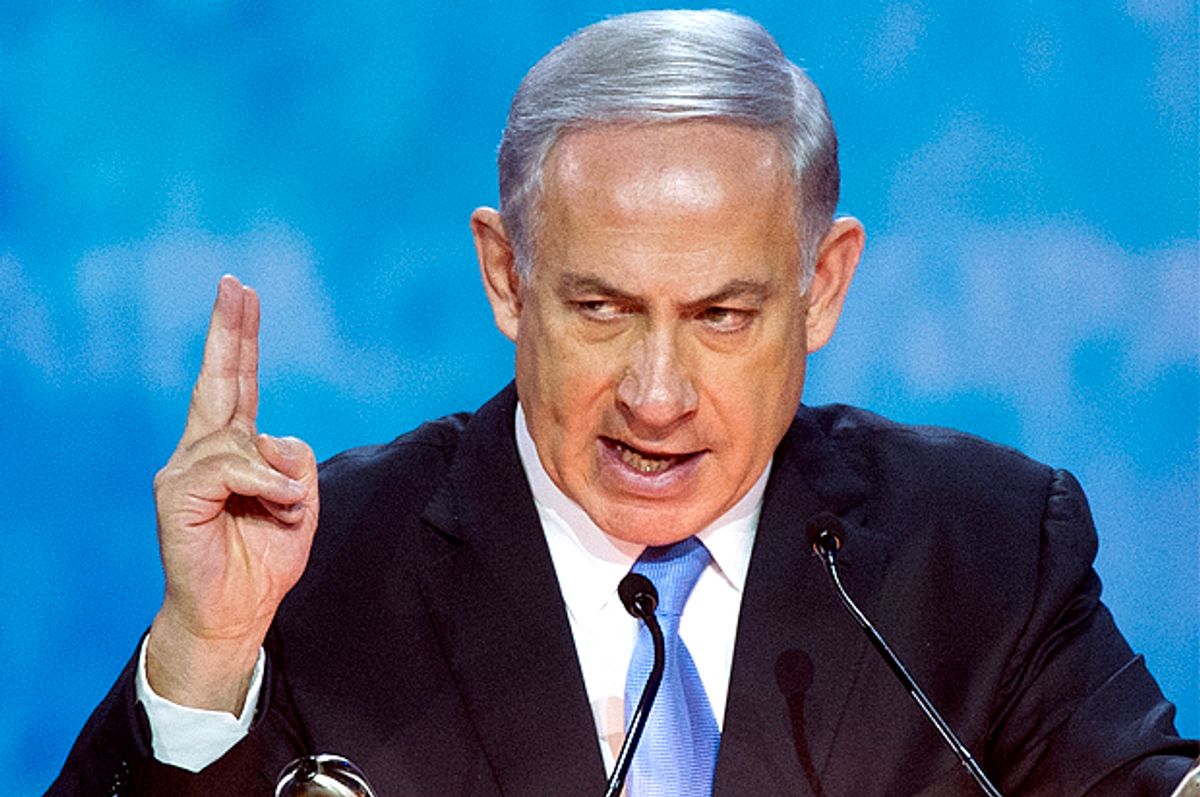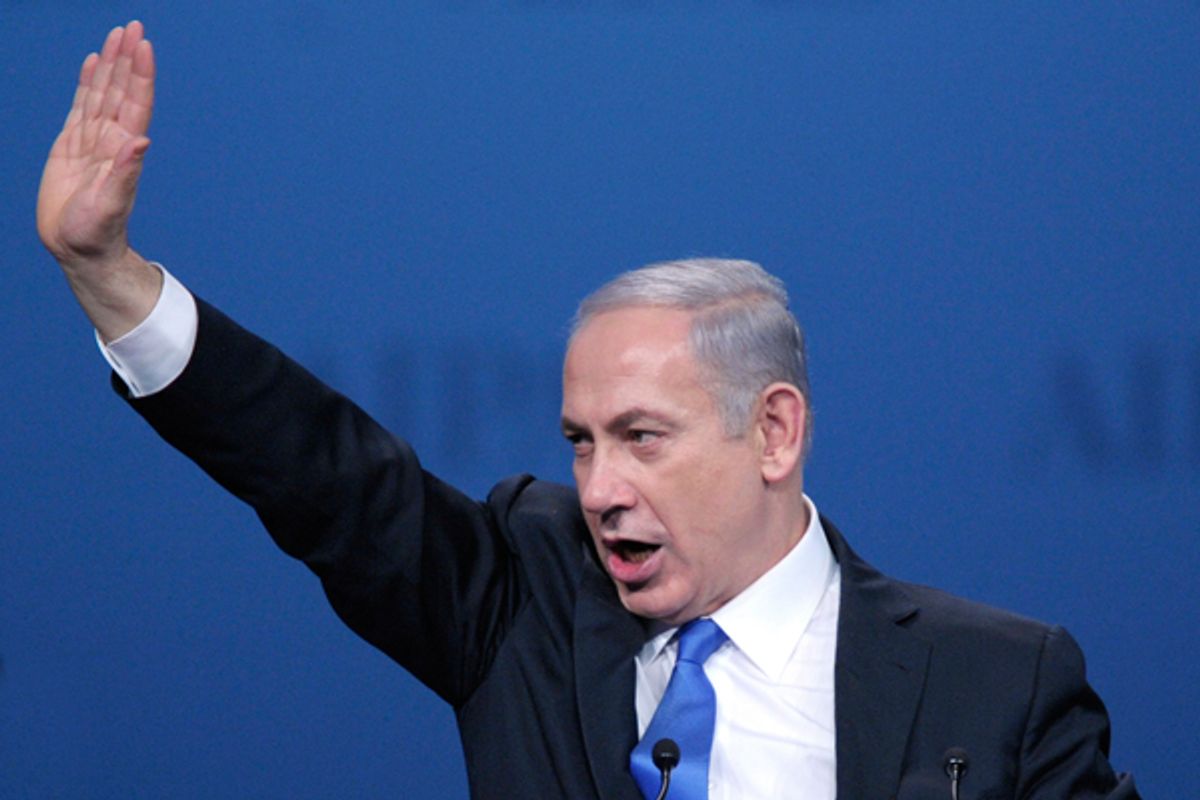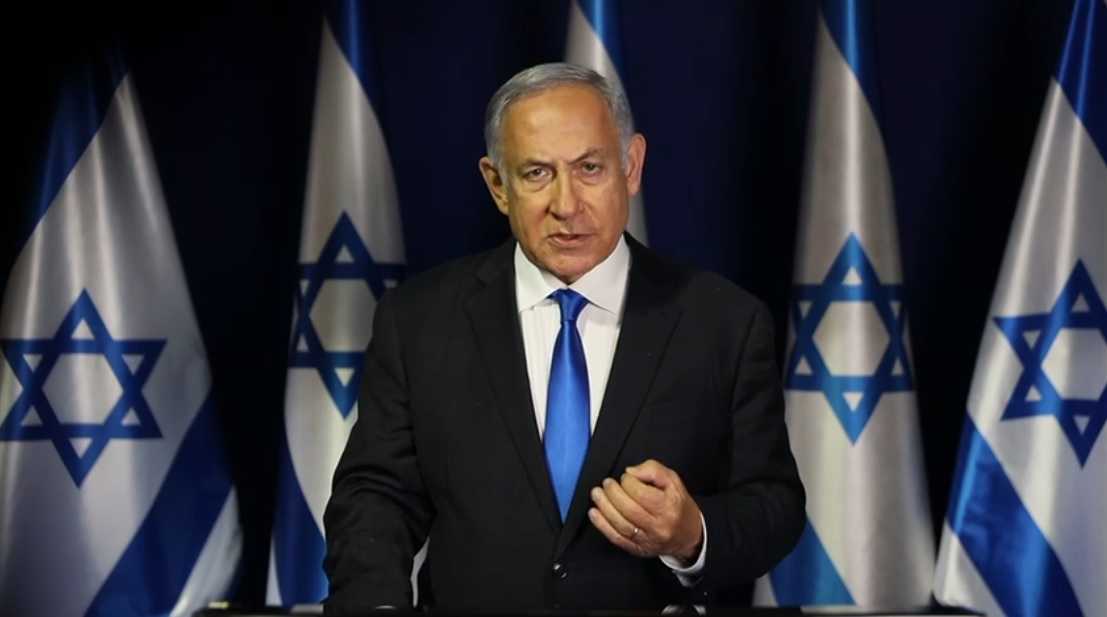
Netanyahu may have been angry the US refused to veto the UN ceasefire resolution but he will still use it to prolong the Gaza genocide.
Netanyahu Will Use the UN Ceasefire Resolution
To Prolong Gaza’s Genocide
Mitchell Plitnick / Mondoweiss
(March 29, 2024) — The United Nations Security Council was able to pass a resolution this week demanding an immediate but very temporary ceasefire in Gaza. That ceasefire was only intended to last through the end of Ramadan, which is expected to end on April 9. Thus, even if Israel, Hamas, and the various other fighters in Gaza stopped all the shooting, bombing, rocket fire, and the rest of the ugliness, it would only have lasted barely two weeks.
Of course, the fighting did not cease, or even slow down, in the wake of the resolution. The obvious question, then, is, what was the point?
For most of the Security Council, the desire to be on the record calling for a stop to the slaughter in Gaza was the main motivation. And it should not be lost that all ten of the non-permanent members of the Council came together to sponsor this resolution. But why did the United States abstain rather than veto the resolution, as it had done to three prior resolutions calling for a ceasefire in Gaza?
The short answer is also the simple one: the US was looking for a way to ease the pressure it is under from both its allies around the world and Democratic voters in the United States. Both groups are boiling with frustration at the Biden administration’s game of paying lip service to the lives of the tens of thousands of Palestinians they have partnered with Israel to murder in Gaza while continuing the flow of weapons to maintain that unabated genocide.
The question for the Biden administration was how to find a way to make a public statement to give the illusion of real action to rein Israel in while actually changing nothing on the ground. This resolution does that.

Not everyone on Biden’s team is as blind to the political realities as the President himself seems to be. His policy in Gaza is extremely unpopular. A recent Gallup poll shows that the majority of all Americans, 55%, now oppose Israel’s actions in Gaza. When you eliminate Republicans, the overwhelming majority of whom will not vote for Biden under any circumstances, the numbers grow much starker.
Only 18% of Democrats and 29% of Independents approve of Israel’s actions. A poll conducted a few days earlier found that Biden’s handling of the Middle East, in general, had the lowest approval rating (27%) of any of his policies, none of which reached 50% approval.
Yet Biden insists on pursuing this self-defeating, blood-soaked policy. In fact, the Biden administration has just greenlit the sale of more bombs and fighter jets to Israel, including 2000-pound bombs that have been responsible for much of the mass slaughter in Gaza.
Given that, all Biden can do is try to cast an illusion and hope to convince enough voters that his alternative reality is the truth. That’s what this resolution was in terms of its effect on the people of Gaza. In other ways, as I explained here, this was a step forward, but those mostly concern international relations and the long-term bigger picture.

Netanyahu’s Anger
If the resolution had little effect, and no one has made the case that it has any more than that, then what was Israeli Prime Minister Benjamin Netanyahu so angry about? This is where we come to the main divergence in the agendas of the Biden administration and the Netanyahu government.
Both agree on the general parameters of Israel’s actions in Gaza. The US is not pleased with how blatant the genocide has been, but it is not so upset that it is prepared to stop Israel from pursuing it. This is despite the fact that Israel’s military operations have proven to be an obstacle to getting the hostages held in Gaza released and the fact that few in Washington (indeed, few even in the Israeli military and intelligence apparatus) truly believe that Hamas can be “eliminated” by military force.
But Biden does want to see an end to Israel’s campaign of slaughter and destruction. The end he envisions, of course, is not a pleasant one for Palestinians. His “day after” vision includes a hand-picked Palestinian leadership that has all the quisling characteristics of the current Palestinian Authority but with more popular buy-in among Palestinians, a return to two-state negotiations to nowhere, and pacification of all Palestinian resistance. This is a fantasy.
Netanyahu envisions more direct Israeli control of Gaza and, quite possibly, a Gaza that has been partially or mostly cleansed of Palestinians. His concern is that it also means that the military campaign will be at an end. With that ending, Netanyahu’s tenure as prime minister — the longest in Israel’s history — will almost certainly be at an end. Without the protection of his office, Netanyahu faces the potential of many years in prison for his many acts of corruption.
In short, Netanyahu does not want this campaign to end unless and until he can salvage his political career. His hope is that he can do this by eradicating Hamas and pacifying the Palestinian people, thus “winning” the century-long struggle for possession of all of Palestine. Short of that, he will simply prolong the war until some opportunity to save his own hide presents itself.

This explains why Netanyahu has not complained more forcefully about US opposition to an all-out assault on Rafah. Israel continues to launch bombing raids at the besieged area at Gaza’s southern tip, and Rafah continues to starve, thirst, and exist as a breeding ground for disease, with much of Gaza’s already dense population crammed into its small space.
So, Israel has hardly given Rafah much respite, even as it has refrained thus far from its anticipated assault. But it would still seem puzzling, on the surface, that Israel seems to have stayed in its holding pattern regarding Rafah. There have been some rumblings about possibly suspending aid to Israel if it invades Rafah in defiance of the US, but these have been quickly walked back, and Netanyahu is likely to call Biden’s bluff at some point.
Netanyahu is comfortable going slowly, as it turns out. While he waits to attack Rafah, he projects an image of standing up to Washington, continues to pursue genocide in Gaza as a whole, allows the relative dearth of headline news to calm the atmosphere a bit, and, should he decide to escalate fighting somewhere aside from Rafah, gradually turns up the volume on Israeli attacks on both Hezbollah targets and civilian sites in Lebanon.
Israelis are starting to notice Netanyahu’s delaying tactics. Gideon Sa’ar, a decidedly right-wing Knesset Member who has spent most of his career attacking Netanyahu, quit Netanyahu’s government on Monday. Sa’ar had previously dissolved his New Hope party’s partnership with Benny Gantz’s Blue and White party because he said Gantz was not conveying his views in Israel’s war cabinet. That is a three-man decision-making bloc of Netanyahu, Gantz, and Defense Minister Yoav Gallant which essentially makes the big decisions about the Gaza campaign.
Sa’ar then resigned from the government entirely because Netanyahu had been slowing the progress of the “war” in a way that he said was“contrary to the national interest.” Sa’ar said that to accomplish Israel’s goals, “it was necessary to act on a faster schedule.”

That slow pace is not always easy for Netanyahu to explain, but both Gallant and Gantz are very leery of pushing the White House into an even tighter corner than it is already in, so they are content to be patient about invading Rafah, though they both support doing so. Sa’ar would likely have seen their argument as reasonable, but even if he didn’t, Netanyahu would have had all the support he would need to continue on this course.
Ironically, Biden’s dread of backlash should Israel launch a full invasion of Rafah serves Netanyahu’s aims well. The Americans have told the Israelis that they support an action in Rafah, but only one that won’t bring an even bigger humanitarian disaster than the one that is already causing Biden big political problems (the actual lives of Palestinians are not an issue in Washington any more than they are in Israel).
But after watching the State Department’s lead propagandist, Matthew Miller, make an unseemly spectacle of himself by bluntly stating that the United States has concluded that Israel has conducted itself in Gaza within the boundaries of international law regarding both its military actions and in allowing aid to enter the besieged Strip, we have seen a likely harbinger of things to come.
On March 20, Israel submitted a required statement to the US assuring them that its use of American weapons was in line with US and international law. This obvious fabrication became even more appalling when Miller stated on Monday, “We’ve had ongoing assessments of Israel’s compliance with international humanitarian law. We have not found them to be in violation, either when it comes to the conduct of the war or the provision of humanitarian assistance. We view those assurances through that ongoing work we have done.”

That was such an obvious lie that Senator Bernie Sanders, noting the virtual blockade on humanitarian aid Israel has imposed and the enormous number of civilian deaths, stated, “To pretend that Israel is not violating international law or interfering with US humanitarian aid is absurd on its face. The State Department’s position makes a mockery of US law and assurances provided to Congress.”
We can expect something similar in Rafah, eventually. Israel will undertake an operation with some features it can argue are meant to protect civilians. It will blame Hamas for the many civilian casualties, and the United States will accept the Israeli story. Israel’s goal — very likely with the silent buy-in of the Biden administration — will be to eventually finish the job in Rafah with just enough obfuscation to avoid punitive measures from Washington and have Biden maintain his defense of Israeli actions.
The UNSC resolution, like his public feuding with Biden gives Netanyahu an argument for why he is slow-walking the next phase of the genocide. While Israel rejected the resolution, it can argue that it limited its activities during Ramadan after the resolution, and gave itself more time to work on some plan to destroy Rafah while minimizing civilian casualties.
Netanyahu has stretched out the waiting period and likely will continue to do so through Ramadan and potentially longer. Eventually, pressure within Israel will make it impossible to wait any longer. But Netanyahu knows that even if a Rafah invasion is successful in both Israeli and American eyes, there will be more armed resistance after this ongoing nightmare. And there is always the possibility of drawing Hezbollah into a bigger conflict. He can continue his wartime footing and his hold on his office for a seemingly endless period if he is allowed to by Washington and by the Israeli people.
None of this is mitigated by the UNSC resolution or by any American actions. The situation there remains the same as before: unless Biden is willing to halt the flow of arms to force Israeli compliance, Netanyahu has every reason to continue the “war” as long as he can. He is motivated by self-interest, not concern over Israeli hostages or even Israel’s own long-term interests. He will keep the operations going until he thinks he has done something that will save his job, a goal which may be even more impossible than eliminating Palestinian resistance.
While his failure may be tempting to celebrate, it means Israel will continue its genocidal march until they are stopped. It is in this light that we must see the passage of even this weak UNSC resolution. It shows that pressure can work, and if that pressure is maintained, eventually, the Bidens and Netanyahus of the world run out of tricks to avoid it.

AtMondoweiss, we understand the power of telling Palestinian stories. For 17 years, we have pushed back when the mainstream media published lies or echoed politicians’ hateful rhetoric. Now, Palestinian voices are more important than ever. Our traffic has increased ten times since October 7, and we need your help to cover our increased expenses.
Posted in accordance with Title 17, Section 107, US Code, for noncommercial, educational purposes.